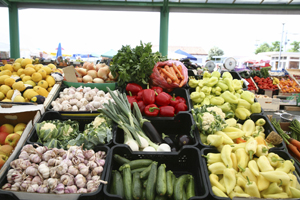
Many customers ask what we do all summer. Work goes on as usual, although our focus shifts during this time of year — from growing and harvesting to repairing and preparing.
by Bob McClendon —
Every summer, as the temperature starts to rise and we begin to wind down at the farmers’ markets, we get the same question: “Why don’t you sell during the summer?” This is a good question and is asked by many.
In recent years, farmers’ markets have become very popular all across America. This popularity is a result of a nationwide trend that allows the consumer access to locally grown meats, poultry, fruits and vegetables. These markets also enable consumers to develop relationships with the farmers who produce their food.
Farmers’ markets have brought seasonal eating back into awareness. For a number of years now, consumers have come to expect that all fruits and vegetables will be available on a year-round basis. Modern transportation and big global agri-business have made it easy for a grocer to have grapes and melons, for example, available for retail purchase 12 months out of the year. As a result, seasonality as we used to know it has disappeared.
These kinds of expectations have also carried over to farmers’ markets. Here in the desert, our prime growing season runs from October through the end of June. We are blessed with nine months of great weather in which to grow our fruits and vegetables.
Our growing season is 180 degrees opposite of the East Coast, Midwest and Pacific Northwest. Those areas have a short growing season, lasting only four to five months due to their colder climates and, therefore, do not hold farmers’ markets in the late fall, winter and early spring months.
The hottest months in Arizona (high/low temperatures combined) are July, August and September. Very little produce grows well during these months. High daytime temperatures, ranging from 105 to 115 degrees, coupled with nighttime lows in the high 80s and mid-to-low 90s, are not tolerated by 98 percent of all types of vegetables.
Plants that can tolerate 100-degree-plus heat during the day need cool nighttime temperatures in the 60s and 70s to rest. Even if you could get them to grow, carrots would taste soapy and lettuces bitter. We do grow basil and arugula under 40-percent shade houses during the hot summer months. But as a result, we are unable to have an offering (both in variety and abundance) that could stock a farmers’ market during this time period.
You will find a few farmers’ markets open during the summer in the Phoenix area, however. This is because some organizers want to continue to collect rent money from the vendors, and some vendors need the revenue to sustain their businesses.
Operating in very hot outdoor temperatures is devastating to the produce being offered for sale. Most of that produce has been purchased from other areas with cooler summer climates. You are much better off buying your fruits and vegetables at a grocery store, where they have been properly transported and stored at correct temperatures.
Many people ask farmers, “Where can I go to purchase organic fruits and vegetables when you are closed?” There are not a lot of options. Whole Foods Market carries an extensive line of organic produce. It is expensive but as fresh as it can be, considering the distances traveled. I personally like Safeway. They have a nice offering of organic fruits and vegetables at reasonable prices. As a grocery chain, they have made a serious commitment to a variety of organic foods, which are available in most of the aisles throughout their stores. It also seems that the food they carry is handled with safety and freshness in mind.
If you do decide to shop local Phoenix area farmers’ markets, beware of vendors claiming to be certified organic. Ask to see a certificate with their name on it that was issued by a certifying agency. They also should be able to produce a list of items they grow from the same organic certifier. We proudly display our certificates at every market we attend.
Many customers ask what we do all summer. Work goes on as usual, although our focus shifts during this time of year — from growing and harvesting to repairing and preparing. We use our three summer months to make improvements to our physical plant and perform needed maintenance, not forgetting to tend to the weeds.
The most important work we do, though, is improving our soil. We give back more nutrients than we took out the season before, so that each year it gets healthier and more fertile. Our healthy, bioactive soil is simply the most important asset we have at the farm, and this period of rest and renewal is invaluable to our next growing season.
We are very appreciative of the support and interest from our customers throughout the season at the farmers’ markets. The time spent away from the markets during the summer months means that we are able to tend to the farm and continue to produce a rich and varied offering of the best organic fruits and vegetables. This farm is very much a living, vibrant entity, and as with everything living, a little rest and proper nutrition are vital in order for it to grow and thrive.
Bob McClendon is the farmer behind McClendon’s Select, organic produce that is grown only with nature’s help. He can be found during the cooler months at the Town and Country Market in Phoenix and the Scottsdale Old Town Farmers’ Market. www.mcclendonsselect.com or 866-979-5279.
Reprinted from AZNetNews, Volume 30, Number 4, Aug/Sept. 2011.





February 23, 2012
Business, Farmers' markets, Food, Lifestyle, Nutrition